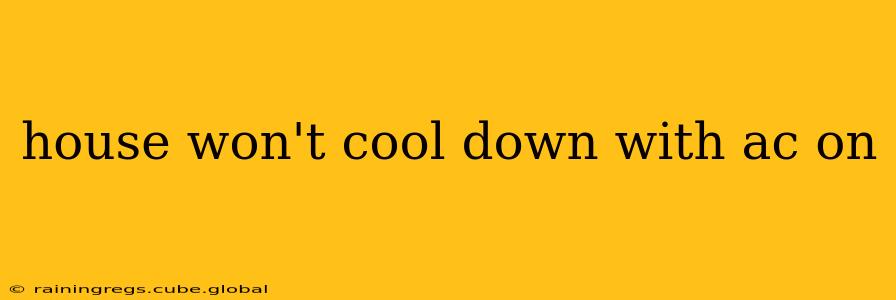Summer heat can be unbearable, and when your air conditioner fails to cool your home effectively, frustration mounts. This comprehensive guide will help you diagnose why your house isn't cooling down, even with the AC running, and offer solutions to get your home comfortably cool again.
Why Isn't My AC Cooling My House?
This is the central question many homeowners face. The reasons are multifaceted, ranging from simple fixes to more complex, potentially expensive repairs. Let's explore the most common culprits.
Is the Air Filter Clogged?
This is often the simplest and most overlooked reason. A dirty air filter restricts airflow, forcing your AC unit to work harder and less efficiently. A severely clogged filter can prevent cooling altogether. Solution: Check your filter and replace it if necessary. Aim to change your air filter every 1-3 months, or more frequently if you have pets or allergies.
Is the Thermostat Set Correctly?
Seems obvious, but double-checking the thermostat is crucial. Ensure it's set to "cool," the temperature is appropriately low, and the fan is set to "auto" (not "on"). A malfunctioning thermostat can also be the issue, so testing its accuracy is important. Solution: Check the thermostat settings and consider replacing it if you suspect a malfunction.
Are the Vents Blocked or Closed?
Restricted airflow anywhere in your home's ductwork will hinder cooling. Check all vents to ensure they're open and unobstructed by furniture or other items. Closed vents in certain rooms will force the AC to work harder to cool the rest of the house. Solution: Open all vents and clear any obstructions.
Are There Leaks in Your Ductwork?
Leaks in your ductwork can significantly reduce the efficiency of your air conditioning system. This allows cool air to escape into areas you don't want it, such as attics or crawl spaces, preventing effective cooling in the living areas. Solution: A professional inspection can identify leaks, which can then be sealed for improved efficiency.
Is Your AC Unit Properly Sized?
An AC unit that's too small for your home will struggle to cool it effectively, constantly running without reaching the desired temperature. Conversely, an oversized unit can cycle on and off too quickly, preventing consistent cooling. Solution: Consult an HVAC professional to determine if your unit is appropriately sized for your home's square footage and insulation.
Is the Refrigerant Low?
Refrigerant is essential for your AC unit's cooling process. Low refrigerant levels will severely impact cooling capacity. Solution: This is a job for a qualified HVAC technician. They will use specialized equipment to diagnose and recharge the refrigerant if needed. Never attempt to handle refrigerant yourself as it can be dangerous.
Is the Condenser Coil Dirty?
A dirty condenser coil (the outdoor unit) restricts airflow, reducing cooling efficiency. Accumulated dirt, debris, and even plant growth can significantly impair its performance. Solution: Gently clean the condenser coil with a garden hose and brush. Avoid using high-pressure water. For extensive cleaning or if you're uncomfortable doing this yourself, call a professional.
Is the Compressor Failing?
The compressor is the heart of your AC unit. If it's malfunctioning, your system won't cool properly. This requires professional diagnosis and repair. Solution: Call a qualified HVAC technician for repair or replacement.
What Else Could Be Wrong with My Air Conditioner?
Beyond the common issues above, several other factors could contribute to your cooling woes:
- Electrical problems: A faulty capacitor, wiring issues, or other electrical problems can prevent your AC unit from working correctly.
- Frozen evaporator coil: This can occur due to low refrigerant, restricted airflow, or a dirty air filter.
- Failing blower motor: The blower motor circulates air through your home. If it is not functioning properly, then the cool air will not be properly circulated.
When to Call a Professional
If you've checked the simple fixes and your house is still not cooling down, it's time to call an HVAC professional. They have the tools and expertise to diagnose more complex issues and perform necessary repairs. Ignoring problems can lead to more significant damage and higher repair costs down the line.
Remember, maintaining your AC unit regularly is key to preventing these issues and ensuring it operates efficiently throughout the summer. Regular filter changes, annual inspections, and prompt attention to any issues will keep your home cool and comfortable.
